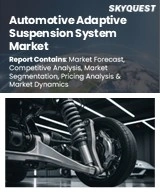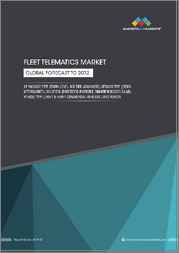
|
시장보고서
상품코드
1700168
밴 개조 시장 : 차량 유형, 차량 사이즈, 개조, 용도, 최종 사용자, 지역별 분석 및 예측(-2032년)Van Conversion Market Forecasts to 2032 - Global Analysis By Vehicle Type (Recreational Vans, Commercial Vans, Expedition Vans, Emergency Service Vans and Other Vehicle Types), Vehicle Size, Conversion, Application, End User and By Geography |
||||||
Stratistics MRC에 따르면 세계의 밴 개조 시장은 2025년에 27억 달러를 차지하고 예측 기간 동안 CAGR은 9.5%를 나타내며 2032년에는 51억 달러에 이를 것으로 전망됩니다.
밴 개조는 표준 밴을 다양한 목적으로 맞춤형 거주 공간 및 특수 차량으로 변경하는 것입니다. 풀타임의 생활에 인기가 있어 유연성과 기동성을 제공합니다.커스터마이즈의 범위는 심플한 디자인으로부터 고급스러운 풀 장비의 셋업까지 다방면에 걸칩니다.
프랑스에 본부를 두고 있는 자치정부간 기관, 국제에너지기구(IEA)에 따르면 2023년 전기차 판매 대수는 2022년을 350만대 웃돌아 전년대비 35% 증가했습니다.
다기능 이동성 솔루션에 대한 수요 증가
소비자는 레크리에이션 여행, 이동 오피스, 배송 서비스 등 다양한 요구에 대응하는 다기능 자동차를 요구하게 되어 있습니다. 컴팩트한 주방, 취침 공간, 고급 수납 솔루션 등 맞춤형 기능을 갖추고 있으며, 현대의 라이프 스타일에 이상적입니다.
공급망의 혼란과 규제의 복잡성
세계적인 공급망의 과제로 인해 필수적인 부품과 재료 조달이 지연되어 생산 비용 상승과 납기 연장이 이어지고 있습니다. 또한, 지역 간의 다양하고 엄격한 규제 프레임 워크를 탐색하는 것은 복잡성에 박차를 가하고 제조업체와 소비자 모두에게 장벽을 만듭니다. 이러한 과제는 기술 혁신을 막고 특히 중소기업의 경우 시장 확대를 제한합니다. 그 결과, 맞춤형 다목적 밴 솔루션에 대한 수요가 증가함에 따라 시장은 큰 장애에 직면하고 있습니다.
틈새 상업 및 긴급 분야로 확대
헬스케어, 재해 대응, 이동 지휘 부대 등의 산업용 특수 차량은 그 적응성과 효율성으로부터 높은 수요가 있습니다. 긴급 분야에서는 첨단 의료 시스템과 통신 시스템을 탑재한 커스터마이즈 된 밴이 필요하지만, 이동 소매 및 푸드서비스 등 틈새 상업 용도가 인기를 끌고 있습니다. 이러한 다양화를 통해 제조업체는 미개발 시장을 개발하고 혁신을 촉진하며 수익원을 높일 수 있습니다. 이 추세는 밴 개조 산업에서 맞춤형 솔루션의 중요성을 높이고 있습니다.
경기변동과 경쟁의 포화
경제 변동과 경쟁 시장의 포화는 밴 개조 시장에 큰 도전을 제기하고 있습니다. 경제 상황의 변동은 밴 개조와 같은 재량 항목에 대한 소비자 지출의 감소로 이어져 시장 성장에 영향을 미칩니다. 인플레이션 증가와 예측 불가능한 금융 동향은 제조업체와 구매자를 더욱 긴장시킵니다. 중소기업은 기존 브랜드와의 경쟁에 어려움을 겪으며 시장에서의 존재를 제한합니다. 이러한 요인은 시장의 지속적인 성장과 수익성 달성을 방해합니다.
COVID-19의 영향 :
COVID-19의 유행은 밴 개조 시장에 다양한 영향을 주었습니다.의 감소가 시장 성장의 방해가 되었습니다.자급자족 여행이나 DIY밴 개조의 트렌드가 높아져, 규제가 완화되어, 소비자의 기호가 유연한 모빌리티 솔루션으로 쉬프트 했기 때문에 시장의 회복을 뒷받침했습니다.
예측 기간 동안 레크리에이션 밴 부문이 최대가 될 전망
레크리에이션용 밴 부문은 다양한 용도와 소비자층의 확대로 예측기간 중 최대 시장 점유율을 차지할 것으로 예상됩니다. 피스로도 사용되게 되어 왔습니다.이 성장을 지지하고 있는 것은 뛰어난 쾌적성과 편리성을 제공하는 밴 개조 기술의 진보입니다.
휠&타이어 개조 분야는 예측 기간 중 가장 높은 CAGR이 예상됩니다.
예측 기간 동안 휠 및 타이어 개조 분야는 오프로드 성능 향상에 대한 수요가 증가함에 따라 가장 높은 성장률을 보일 것으로 예상됩니다. 이러한 개조는 까다로운 지형과 극단적인 기상 조건으로 인해 맞춤형 솔루션을 요구하는 밴 소유자들 사이에서 특히 인기가 있습니다.
최대 점유율을 차지하는 지역 :
예측 기간 동안 아시아 태평양 지역은 급속한 도시화, 전자상거래 물류의 호황, 전기 상용차를 우선시하는 인도의 FAME II 제도 및 중국의 신에너지 차량(NEV) 보조금과 같은 정부 주도의 인프라 현대화 이니셔티브에 힘입어 가장 큰 시장 점유율을 차지할 것으로 예상됩니다. 또한 일본과 한국의 인구 고령화로 인해 개조된 밴 플랫폼을 기반으로 한 모바일 헬스케어 및 노인 케어 유닛에 대한 투자에 박차를 가하고 있습니다. 동남아시아의 비용 효율적인 제조 허브는 BYD 및 타타 모터스와 같은 OEM이 글로벌 시장을 위한 전기 밴 섀시 생산을 확대하면서 이 지역의 리더십을 더욱 공고히 하고 있습니다.
CAGR이 가장 높은 지역 :
예측 기간 동안 북미는 가장 높은 CAGR을 나타낼 것으로 예측되며 전기 밴 개조의 채용이 가속화되고 레크리에이션 수요가 견조하다는 것이 뒷받침되고 있습니다. 포드 프로와 FEMA와의 제휴로 대표되는 이동식 작업 공간과 재해 대응 유닛에 대한 기업 투자도 성장을 뒷받침합니다.
무료 사용자 지정 오퍼링 :
이 보고서를 구독하는 고객은 다음 무료 맞춤설정 옵션 중 하나를 사용할 수 있습니다.
- 기업 프로파일
- 추가 시장 기업의 종합적 프로파일링(3개사까지)
- 주요 기업의 SWOT 분석(3개사까지)
- 지역 세분화
- 고객의 관심에 응한 주요국 시장 추계·예측·CAGR(주 : 타당성 확인에 따름)
- 경쟁 벤치마킹
- 제품 포트폴리오, 지리적 존재, 전략적 제휴에 기반한 주요 기업 벤치마킹
목차
제1장 주요 요약
제2장 서문
- 개요
- 이해관계자
- 조사 범위
- 조사 방법
- 데이터 마이닝
- 데이터 분석
- 데이터 검증
- 조사 접근
- 조사 자료
- 1차 조사 자료
- 2차 조사 정보원
- 전제조건
제3장 시장 동향 분석
- 성장 촉진요인
- 성장 억제요인
- 기회
- 위협
- 용도 분석
- 최종 사용자 분석
- 신흥 시장
- COVID-19의 영향
제4장 Porter's Five Forces 분석
- 공급기업의 협상력
- 구매자의 협상력
- 대체품의 위협
- 신규 참가업체의 위협
- 경쟁 기업간 경쟁 관계
제5장 세계의 밴 개조 시장 : 차량 유형별
- 레크리에이션 밴
- 상용 밴
- 익스페디션 밴
- 긴급 서비스 밴
- 기타 차량 유형
제6장 세계의 밴 개조 시장 : 차량 사이즈별
- 소형 밴
- 중형 밴
- 풀 사이즈 밴
제7장 세계의 밴 개조 시장 : 개조별
- 캠핑카 개조
- 어드벤처 밴 개조
- 고급 밴 개조
- 상업용 밴 개조
- 기타 개조
제8장 세계의 밴 개조 시장 : 용도별
- 휠 및 타이어 개조
- 외관 및 차체 개조
- 인테리어 개선
- 조명 업그레이드
- 기타 용도
제9장 세계의 밴 개조 시장 : 최종 사용자별
- 개인 소비자
- 렌탈 및 관광회사
- 기업 및 상업용 사용자
- 기타 최종 사용자
제10장 세계의 밴 개조 시장 : 지역별
- 북미
- 미국
- 캐나다
- 멕시코
- 유럽
- 독일
- 영국
- 이탈리아
- 프랑스
- 스페인
- 기타 유럽
- 아시아태평양
- 일본
- 중국
- 인도
- 호주
- 뉴질랜드
- 한국
- 기타 아시아태평양
- 남미
- 아르헨티나
- 브라질
- 칠레
- 기타 남미
- 중동 및 아프리카
- 사우디아라비아
- 아랍에미리트(UAE)
- 카타르
- 남아프리카
- 기타 중동 및 아프리카
제11장 주요 발전
- 계약, 파트너십, 협업, 합작투자
- 인수와 합병
- 신제품 발매
- 사업 확대
- 기타 주요 전략
제12장 기업 프로파일링
- Adventure Van Custom Conversions
- Winnebago
- Braun Ability
- Vantage Mobility International(VMI)
- MobilityWorks
- Freedom Motors
- Revability
- AMS Vans
- Rollx Van
- Shelby
- New Horizons RV
- Heartland Road Warrior
- General Motors
- Vanlife Customs
- Ford Pro
- Aluminum Toy Haule
According to Stratistics MRC, the Global Van Conversion Market is accounted for $2.7 billion in 2025 and is expected to reach $5.1 billion by 2032 growing at a CAGR of 9.5% during the forecast period. Van conversion is transforming a standard van into a customized, livable space or a specialized vehicle for various purposes. This process typically involves modifying the interior to include amenities such as beds, kitchens, storage, and sometimes bathrooms. Van conversions are popular for camping, road trips, and full-time living, offering flexibility and mobility. The customization can range from simple designs to luxurious, fully-equipped setups. These conversions may also be tailored for specific uses like mobile offices, workshops, or recreational vehicles.
According to the International Energy Agency (IEA), a France-based autonomous intergovernmental organization, sales of electric cars in 2023 were 3.5 million higher than in 2022, a 35% year-on-year increase.
Market Dynamics:
Driver:
Rising demand for multifunctional mobility solutions
Consumers are increasingly seeking versatile vehicles that cater to diverse needs, such as recreational travel, mobile offices, and delivery services. This trend is fueled by the growing popularity of remote work, adventure tourism, and eco-friendly travel options. Van conversions offer customizable features like compact kitchens, sleeping areas, and advanced storage solutions, making them ideal for modern lifestyles. As a result, the market is witnessing robust growth, with manufacturers innovating to meet evolving consumer preferences.
Restraint:
Supply chain disruptions and regulatory complexity
Delays in sourcing essential components and materials due to global supply chain challenges have led to increased production costs and extended timelines. Additionally, navigating diverse and stringent regulatory frameworks across regions adds to the complexity, creating barriers for manufacturers and consumers alike. These challenges discourage innovation and limit market expansion, particularly for small and medium-sized enterprises. As a result, the market faces significant obstacles in meeting the rising demand for customized and versatile van solutions.
Opportunity:
Expansion into niche commercial and emergency sectors
Specialized vehicles for industries like healthcare, disaster response, and mobile command units are in high demand due to their adaptability and efficiency. Emergency sectors require customized vans equipped with advanced medical or communication systems, while niche commercial applications, such as mobile retail or food services, are gaining traction. This diversification allows manufacturers to tap into untapped markets, fostering innovation and boosting revenue streams. The trend highlights the growing importance of tailored solutions in the van conversion industry.
Threat:
Economic volatility and competitive saturation
Economic volatility and competitive saturation are posing significant challenges to the van conversion market. Fluctuating economic conditions lead to reduced consumer spending on discretionary items like van conversions, impacting market growth. Rising inflation and unpredictable financial trends further strain manufacturers and buyers alike. Smaller players struggle to compete with established brands, limiting their market presence. These factors collectively hinder the market's ability to achieve sustained growth and profitability.
Covid-19 Impact:
COVID-19 pandemic had a mixed impact on the van conversion market. Strict lockdowns and travel restrictions initially caused a decline in demand, as leisure travel and tourism came to a halt. Additionally, supply chain disruptions and reduced consumer spending further hindered market growth. The rising trend of self-sufficient travel and DIY van conversions gained momentum, helping the market recover as restrictions eased and consumer preferences shifted toward flexible mobility solutions.
The recreational vans segment is expected to be the largest during the forecast period
The recreational vans segment is expected to account for the largest market share during the forecast period due to their versatile applications and expanding consumer base. These vans are increasingly being used not only for leisure but also as mobile homes and temporary offices, aligning with evolving lifestyles. The growth is supported by advancements in van conversion technologies, offering superior comfort and convenience. Rising disposable incomes and the post-pandemic focus on safe, self-contained travel have also contributed to this trend.
The wheel & tire modifications segment is expected to have the highest CAGR during the forecast period
Over the forecast period, the wheel & tire modifications segment is predicted to witness the highest growth rate due to the growing demand for enhanced off-road capabilities and performance. Consumers are increasingly investing in premium wheels and all-terrain tires to improve safety, durability, and aesthetic appeal. These modifications are particularly popular among van owners seeking customized solutions for rugged terrains and extreme weather conditions. Wheel & tire modifications are also benefiting from technological advancements, such as smart tires with pressure monitoring systems.
Region with largest share:
During the forecast period, the Asia Pacific region is expected to hold the largest market share, driven by rapid urbanization, booming e-commerce logistics, and government-led infrastructure modernization initiatives, such as India's FAME II Scheme and China's New Energy Vehicle (NEV) subsidies, which prioritize electric commercial fleets. Additionally, Japan and South Korea's aging populations are spurring investments in mobile healthcare and senior care units built on converted van platforms. Cost-effective manufacturing hubs in Southeast Asia further solidify the region's leadership, with OEMs like BYD and Tata Motors scaling production of electric van chassis for global markets.
Region with highest CAGR:
Over the forecast period, the North America region is anticipated to exhibit the highest CAGR, propelled by accelerating adoption of electric van conversions and robust recreational demand. Stricter emissions regulations, including California's Advanced Clean Fleets Rule, incentivize fleet operators to transition to zero-emission models like Rivian's Electric Delivery Van (EDV). Corporate investments in mobile workspaces and disaster response units exemplified by Ford Pro's partnerships with FEMA also drive growth.
Key players in the market
Some of the key players in Van Conversion Market include Adventure Van Custom Conversions, Winnebago, Braun Ability, Vantage Mobility International (VMI), MobilityWorks, Freedom Motors, Revability, AMS Vans, Rollx Van, Shelby, New Horizons RV, Heartland Road Warrior, General Motors, Vanlife Customs, Ford Pro and Aluminum Toy Haule.
Key Developments:
In March 2025, General Motors (GM) and Hyundai Motor Company entered advanced discussions to collaborate on electric commercial vans in North America. Hyundai plans to supply GM with two electric van models, initially imported from South Korea, with potential local production by 2028.
In March 2024, Winnebago Industries launched the Revel 4x4e, an all-electric version of its flagship adventure van, featuring a proprietary lithium-ion battery system and integrated solar charging. Designed for off-grid sustainability, it targets overlanding enthusiasts and eco-conscious travelers, with a range of 250+ miles on a single charge.
In January 2024, Ford Pro introduced the E-Transit Custom PHEV Conversion Platform, a plug-in hybrid chassis tailored for upfitters. It combines a 30-mile electric range with a gas engine, targeting urban delivery fleets and mobile healthcare units seeking emission-free operation in low-emission zones.
Vehicle Types Covered:
- Recreational Vans
- Commercial Vans
- Expedition Vans
- Emergency Service Vans
- Other Vehicle Types
Vehicle Sizes Covered:
- Compact Vans
- Mid-Sized Vans
- Full-Sized Vans
Conversions Covered:
- Campervan Conversions
- Adventure Van Conversions
- Luxury Van Conversions
- Commercial Van Conversions
- Other Conversions
Applications Covered:
- Wheel & Tire Modifications
- Exterior & Body Modifications
- Interior Enhancements
- Lighting Upgrades
- Other Applications
End Users Covered:
- Individual Consumers
- Rental & Tourism Companies
- Corporate & Commercial Users
- Other End Users
Regions Covered:
- North America
- US
- Canada
- Mexico
- Europe
- Germany
- UK
- Italy
- France
- Spain
- Rest of Europe
- Asia Pacific
- Japan
- China
- India
- Australia
- New Zealand
- South Korea
- Rest of Asia Pacific
- South America
- Argentina
- Brazil
- Chile
- Rest of South America
- Middle East & Africa
- Saudi Arabia
- UAE
- Qatar
- South Africa
- Rest of Middle East & Africa
What our report offers:
- Market share assessments for the regional and country-level segments
- Strategic recommendations for the new entrants
- Covers Market data for the years 2024, 2025, 2026, 2028, and 2032
- Market Trends (Drivers, Constraints, Opportunities, Threats, Challenges, Investment Opportunities, and recommendations)
- Strategic recommendations in key business segments based on the market estimations
- Competitive landscaping mapping the key common trends
- Company profiling with detailed strategies, financials, and recent developments
- Supply chain trends mapping the latest technological advancements
Free Customization Offerings:
All the customers of this report will be entitled to receive one of the following free customization options:
- Company Profiling
- Comprehensive profiling of additional market players (up to 3)
- SWOT Analysis of key players (up to 3)
- Regional Segmentation
- Market estimations, Forecasts and CAGR of any prominent country as per the client's interest (Note: Depends on feasibility check)
- Competitive Benchmarking
- Benchmarking of key players based on product portfolio, geographical presence, and strategic alliances
Table of Contents
1 Executive Summary
2 Preface
- 2.1 Abstract
- 2.2 Stake Holders
- 2.3 Research Scope
- 2.4 Research Methodology
- 2.4.1 Data Mining
- 2.4.2 Data Analysis
- 2.4.3 Data Validation
- 2.4.4 Research Approach
- 2.5 Research Sources
- 2.5.1 Primary Research Sources
- 2.5.2 Secondary Research Sources
- 2.5.3 Assumptions
3 Market Trend Analysis
- 3.1 Introduction
- 3.2 Drivers
- 3.3 Restraints
- 3.4 Opportunities
- 3.5 Threats
- 3.6 Application Analysis
- 3.7 End User Analysis
- 3.8 Emerging Markets
- 3.9 Impact of Covid-19
4 Porters Five Force Analysis
- 4.1 Bargaining power of suppliers
- 4.2 Bargaining power of buyers
- 4.3 Threat of substitutes
- 4.4 Threat of new entrants
- 4.5 Competitive rivalry
5 Global Van Conversion Market, By Vehicle Type
- 5.1 Introduction
- 5.2 Recreational Vans
- 5.3 Commercial Vans
- 5.4 Expedition Vans
- 5.5 Emergency Service Vans
- 5.6 Other Vehicle Types
6 Global Van Conversion Market, By Vehicle Size
- 6.1 Introduction
- 6.2 Compact Vans
- 6.3 Mid-Sized Vans
- 6.4 Full-Sized Vans
7 Global Van Conversion Market, By Conversion
- 7.1 Introduction
- 7.2 Campervan Conversions
- 7.3 Adventure Van Conversions
- 7.4 Luxury Van Conversions
- 7.5 Commercial Van Conversions
- 7.6 Other Conversions
8 Global Van Conversion Market, By Application
- 8.1 Introduction
- 8.2 Wheel & Tire Modifications
- 8.3 Exterior & Body Modifications
- 8.4 Interior Enhancements
- 8.5 Lighting Upgrades
- 8.6 Other Applications
9 Global Van Conversion Market, By End User
- 9.1 Introduction
- 9.2 Individual Consumers
- 9.3 Rental & Tourism Companies
- 9.4 Corporate & Commercial Users
- 9.5 Other End Users
10 Global Van Conversion Market, By Geography
- 10.1 Introduction
- 10.2 North America
- 10.2.1 US
- 10.2.2 Canada
- 10.2.3 Mexico
- 10.3 Europe
- 10.3.1 Germany
- 10.3.2 UK
- 10.3.3 Italy
- 10.3.4 France
- 10.3.5 Spain
- 10.3.6 Rest of Europe
- 10.4 Asia Pacific
- 10.4.1 Japan
- 10.4.2 China
- 10.4.3 India
- 10.4.4 Australia
- 10.4.5 New Zealand
- 10.4.6 South Korea
- 10.4.7 Rest of Asia Pacific
- 10.5 South America
- 10.5.1 Argentina
- 10.5.2 Brazil
- 10.5.3 Chile
- 10.5.4 Rest of South America
- 10.6 Middle East & Africa
- 10.6.1 Saudi Arabia
- 10.6.2 UAE
- 10.6.3 Qatar
- 10.6.4 South Africa
- 10.6.5 Rest of Middle East & Africa
11 Key Developments
- 11.1 Agreements, Partnerships, Collaborations and Joint Ventures
- 11.2 Acquisitions & Mergers
- 11.3 New Product Launch
- 11.4 Expansions
- 11.5 Other Key Strategies
12 Company Profiling
- 12.1 Adventure Van Custom Conversions
- 12.2 Winnebago
- 12.3 Braun Ability
- 12.4 Vantage Mobility International (VMI)
- 12.5 MobilityWorks
- 12.6 Freedom Motors
- 12.7 Revability
- 12.8 AMS Vans
- 12.9 Rollx Van
- 12.10 Shelby
- 12.11 New Horizons RV
- 12.12 Heartland Road Warrior
- 12.13 General Motors
- 12.14 Vanlife Customs
- 12.15 Ford Pro
- 12.16 Aluminum Toy Haule



















